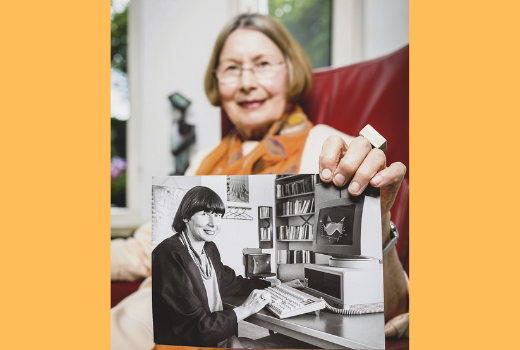(This post is a translation by Dédé de Haan of the article “Als enige vrouw in de wiskunde val je wel op”, written by Ellen de Bruin. The original text, in Dutch, belongs to NRC Media and was published on August 25, 2015 on nrc.nl (https://www.nrc.nl/nieuws/2015/08/15/als-enige-vrouw-in-de-wiskunde-val-je-wel-op-1523725-a657945). The NRC-article has been supplemented with information from an ‘In Memoriam’ written by Hans Zwart for the Bernoulli Gazet (magazine for mathematics alumni of the Rijksuniversiteit Groningen). The picture is by David van Dam. Permission to publish both the text and the picture have been generously granted by all concerned parties.)
The Australian mathematician Ruth Curtain knew that women are treated differently from men when she was very young. “And I thought that was so unfair.” But in her own career she did not experience that, to her surprise. “I expected discrimination when I was studying, but it didn’t come. Maybe I’m an exception, I don’t know. And I hear the stories of other women, but you ask about my experience.” She thinks that in her career she might even have benefited from being the only woman. “That made me stand out. That is very important in science. Unless you do it badly.” And she didn’t.
Curtain came to Groningen at the age of 35, where she became a professor. She had worked for years already in England, and before that in the United States, and she was not actually planning to stay in the Netherlands. But coincidentally, her specialty, system and control theory, flourished in Groningen. This is a sub-area in applied mathematics that develops equations with which, for example, keeping a ship stable or keeping a satellite in orbit can be modeled. Curtain retired in 2006, but she continued to do research: “Easy, as a mathematician.” And together with colleague Hans Zwart she worked on a book about infinite-dimensional systems.
She experienced the worst sexism in Australia as a child in the 1950s. “When I was growing up, it was clear that women were inferior. You had to be neat and polite, beautiful if possible, but you didn’t have to achieve anything. People thought: women are getting married anyway, so money for an education is not a good investment.” At most you could meet a good man at the university, but that was more for middle-class women. Curtain grew up in a working-class family. Her father, a house painter, thought she had to leave school at the age of 14; her parents argued about it. “My father left the house and said: I will never come back. But after three days he was back again.” He had stayed with his mother. “He was strong under the influence of his mother. You have to bear in mind: sexism is in culture in general, women participate as well as men. When a teacher of my mother once fought for equal pay for women, the same resistance came from the women. They couldn’t make them come home with more money than their men.”
When Curtain was 15, her father wanted her to leave school again. “But in the meantime I had received money for textbooks. My mother told my father that I would have to pay it back. That was not true, but then I was allowed to stay at school. And my three sisters after me too. “Then she got high marks at the university and her father turned. “Yes, then he could brag to everyone about his brilliant daughter, which I found annoying.”
Curtain found exact subjects more difficult, she says. “But I loved the challenge and the satisfaction if I understood it completely. For languages and history you have to remember many facts, with mathematics only the structures, then you can trace the rest yourself. “Her favorite subject was physics, but math soon took that spot. “You do it behind your desk. You do not need any equipment and you do not have to wait very long for experimental results. And applied mathematics has a strong connection with physics.”
But math is a real “men’s trade” …? “In the Netherlands, yes!” Says Curtain strict. “The belief that women are not good at mathematics is still very deep in Dutch culture. In Italy or France or Eastern European countries that is not the case.” It was still a bit in the United States, when she went there to study with a Fulbright grant in the 60s. “One professor always had to smile when I entered the lecture hall.”
She graduated from Brown University (Providence, Rhode Island) in 1969, then worked for a year and a half at Purdue University (Lafayette, Indiana) and then moved to Warwick University, England. The famous feminist Germaine Greer (1939), just like Curtain (1941) born in Melbourne, also worked there at the time. “But I never met her.” Greer has clearly made a different choice, says Curtain. “She has the same background as me and she has chosen to fight. I chose to make myself a success. There was also a need for examples, for women who show that it is possible.” Curtain admires women who do both. “But you have to have the personality for that.” Curtain was the first chairman of the successful Rosalind Franklin Fellowship program in Groningen, intended to help newly-promoted women on their way to professorship.
Does she think she has indeed been an example to young women? “I do not know. The problem is that women at a young age prefer not to identify with older women. And whether an older woman who is not married is such an inspiring example? “Marriage just didn’t happen,” she says. “And when I was ready, the most interesting men were already married. But my main goal has always been to discover who I was and what I could achieve.”
After her retirement, Ruth Curtain remained active. She traveled a lot, to Asia and the Middle East, and she attended lectures again –on history, among other things. She was also busy writing a second, again updated version of the book about infinite-dimensional systems, and with Orest Iftime she was writing the solution manual. Although these books are almost finished, she passed away before they were finalized.


